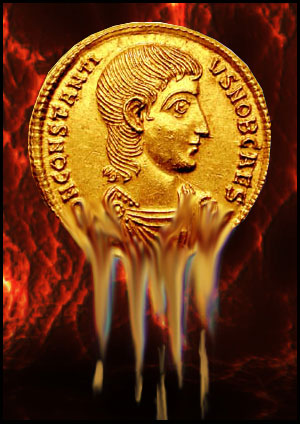 Though the most powerful beast in human history, Rome was still dependent on the flow of money for its lifeblood. In the firm grip of a financial system dating back to Babylon, the Roman war machine was grinding to a halt under an enormous debt burden – and questions were being asked in the Empire’s furthest reaches.
Though the most powerful beast in human history, Rome was still dependent on the flow of money for its lifeblood. In the firm grip of a financial system dating back to Babylon, the Roman war machine was grinding to a halt under an enormous debt burden – and questions were being asked in the Empire’s furthest reaches.
(continued from Saturn Death Cult – Part 2)
To sustain its cycle of debt and war Rome had to constantly expand and swallow up ever more peoples and territory. As a result, and quiet understandably, the peoples at the periphery of the empire were becoming evermore impatient with this policy. The first signs of real trouble had raised its head in the distant Roman province of Judea during the start of the Julian succession of emperors. At the centre of it was, what else, a temple.
A minor event by Roman standards, it seems a certain Judean decided to physically assault the merchant bankers operating out of the main temple in Jerusalem and then declare he was the Son of God come to rescue the lost sheep of the house of Israel. By sheep we can safely assume he meant people, but his actions in beating up and chucking out the merchant bankers caused a major furore amongst the locals. Three years later he was executed for his troubles, but left a smallish band of supporters who continued to preach amongst other things that ‘the love of money is the root of all evil.’
At the time the Romans hardly took any notice of what was to them a squabble between rival priest factions for the control of a minor one-god temple. They had bigger things to worry about and bigger temples to prove it. However, a short thirty-two years later and the Romans had a full-blown uprising on their hands.
Typically, the Romans believed they had to make an absolute example out of this rebellious province and in the most brutal way possible. The temple at the centre of Judean life and resistance was utterly destroyed with documents from the era suggesting atrocities on a scale unheard of with whole populations succumbing to barbaric acts of what today would be called genocidal ethnic cleansing. Back in Rome, the blood-sacrifice junkies purred and the merchant bankers cashed in.
In the meantime, the nearly forgotten followers of the anti-banker Judean quietly dispersed themselves throughout the Roman world while Rome got back to the business of being Rome.
Unfortunately the business of being Rome meant dealing with an extremely overstretched frontier. The debt burden incurred in the defence and maintenance of Rome’s borders grew and grew and, as always in this now familiar pattern, started to implode under its own weight. Rome had reached the limits of its ability to expand and as such could no longer service its debt to the merchant banker families that were now the true power in the empire.
Then it started to happen again, just as it had during the lead up to the catastrophe during the Tower of Babel epoch. The original Roman silver standard that defined the coin of the realm was debased to help pay for the crushing debt owed to the merchant banker class. This set off the inevitable bout of hyperinflation that always follows when a currency is no longer trusted to hold the value its supposed to have. People simply stopped trusting that a Roman coin actually contained the stated amount of precious metal it was supposed to be made up of. Exacerbating this was the self-serving actions of the merchant bankers illegally clipping and filing off the precious metals contained in the increasingly debased currency. Everybody got in on the act and soon Rome’s all important trade tributaries started to grind to a halt.
The economic crisis of the third century was one of history’s most destructive. It provided the backdrop for a series of socio-economic changes that would affect the world for millennia. Though the Imperial Rome of the Caesars would struggle on for another two centuries in one form or another, its days as a vibrant power were numbered and what became known as the Dark Ages stood poised to fill the void.

